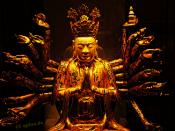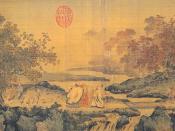The Influence of Chinese Culture on Buddhism
Buddhism was originally developed in India and brought to China over the silk road, and later to some extent through southeast Asia around the first century A.D.. This was during a time when the then reigning Han dynasty was in a state of chaos and Confucianism was being discredited by some intellectuals. The Chinese people therefore came to identify Confucianism with the failing dynasty, and sought a new ideology to take place of stale Confucian thinking. The exact date of the coming of Buddhism to China is unknown, but by 64 A.D. Buddhist monks had introduced written scripture into China.
At first Buddhism was not popular in China. Interest took several centuries to grow because of Buddhism's incongruities with Chinese thought, as well as translation problems (Sanskrit to Chinese). Because Buddhism first entered through China's trading routes with Central Asia, it was seen as the religion of foreign merchants.
Consequently, Large scale translation of Buddhist texts did not truly get under way until the 6th to 8th centuries A.D. This resulted in the wider distribution of Buddhism being delayed several centuries.
Buddhism was difficult for the Chinese to accept because it was "mysterious and hard to understand. Not straight-forward like Confucian teachings, more like the ambiguity of Taoism" (Jin 1), also. it was foreign. Moreover, Buddhism did not focus on problems of state as Confucianism did, and because the study of Confucianism was required material for the exams of public office, practical males preferred its study to that of Buddhism. Moreover, the Buddhist stress on personal fulfillment ("even the Buddha left his family to search for revelation" (Jin 1)) seemed counterintuitive to the Chinese values of family and ancestor worship.
As the religion became more widespread the Chinese people began to adapt distinctly...



The Influence of Chinese Culture on Buddhism
It is a very information paper, however consider revising 1 sentence paragraphs and double check spelling.
3 out of 3 people found this comment useful.